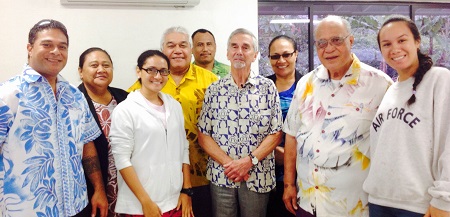
Seen here supporting renowned ethnomusicologiest Dr. Richard Moyle at his talk at ASCC on "The Ethnomusicology of Samoa" are: (l-r) Kuki Tuiasosopo (ASCC Fine Arts), Alofa Nuusila (ASCC Samoan Studies), Anna Afoa (student), Galumalemana Hunkin (Samoan Scholar, ret.), Telei'ai Ausage (Samoan Studies), Dr.Moyle, Tamari Mulitalo-Cheung (Samoan Studies), Fofo I.F. Sunia (Samoan Scholar), and Toni-Marie Hollister (student). (Courtesy Photo)

Seen here supporting renowned ethnomusicologiest Dr. Richard Moyle at his talk at ASCC on "The Ethnomusicology of Samoa" are: (l-r) Kuki Tuiasosopo (ASCC Fine Arts), Alofa Nuusila (ASCC Samoan Studies), Anna Afoa (student), Galumalemana Hunkin (Samoan Scholar, ret.), Telei'ai Ausage (Samoan Studies), Dr.Moyle, Tamari Mulitalo-Cheung (Samoan Studies), Fofo I.F. Sunia (Samoan Scholar), and Toni-Marie Hollister (student). (Courtesy Photo)
Renowned Ethnomusicologist Shares at ASCC
November 17, 2014
By James Kneubuhl, ASCC Press Officer
As part of the Samoana Jazz & Arts Festival earlier this month, renowned ethnomusicologist Dr. Richard Moyle of New Zealand visited the American Samoa Community College (ASCC) to take part in a panel discussion titled “The Ethnomusicology of Samoa.” The panel included ASCC music instructor Kuki Tuiasosopo, who had initially become familiar with Dr. Moyle’s extensive research on Pacific music while pursuing a graduate degree in Ethnomusicology at UH Manoa. “Dr. Moyle gave a very insightful and enjoyable presentation that afternoon, but because it was organized as a festival event, his audience consisted mostly of academics and some interested community members rather than students, which made me think that students most of all should hear about his work.”
Determined to arrange an opportunity for Dr. Moyle to share his knowledge with more students, Tuiasosopo collaborated with the Samoan Studies Department to quickly organize a return visit by Dr. Moyle shortly after the conclusion of the American Samoa portion of the festival. Thus, Dr. Moyle returned to ASCC several days later to speak before an audience consisting this time of students from Fine Arts and Samoan Studies classes. Moyle, who first visited Samoa in the early 1960s as a graduate student and ended up staying long enough to become fluent in the Samoan language, shared his long held observation that rather than remaining a fixed entity, “Samoan music” continually evolves through its integration into cultural and social practices, as well as its ongoing interaction with outside influences.
In Samoan and many other cultures in the Pacific if not the world, songs traditionally reflect and/or celebrate a significant event or occasion. Therefore, singing as a form of oral literature represents what Moyle calls a “window” into a culture’s history and practices. With songs an integrated element of cultural functions, competition among song makers to not only win the approval of an audience but also to out-do one another ensures that the practice of song composition evolves by mixing the expected with the unexpected. This helps explain why most Samoan songs not only retain elements of the indigenous belief system, but also freely incorporate new influences.
“Borrowing is nothing new in Samoan or other Pacific cultures,” Moyle professed, noting how song and dance styles from various island societies were influencing each other long before their exposure to the west. Moyle went on to discuss the role of songs in not only preserving a language but also in perpetuating it. He urged students to take an active role in safeguarding the songs as well as the fagogo (storytelling) of Samoa’s past. “The future direction of a culture depends on the decisions of those living it today,” he told the students in his conclusion, “which places the heritage of tomorrow’s Samoans firmly in your hands.”
With ethnomusicology a largely unexplored subject among American Samoa’s students, Tuiasosopo stressed the importance of giving Moyle a forum to talk about his work. “I believe that this was the first time Moyle has ever presented in American Samoa,” he said. “Not many here know about his research on Samoan traditional music. We’re very fortunate to have access to his recordings of Samoan traditional music, and in the past semesters, my students have done major projects based on his research and recordings of traditional songs and musical instruments.” Besides his peerless expertise, Tuiasosopo felt Moyle could provide an example of how to make an academic presentation interesting to everyday listeners. For this reason, Moyle’s audience included students from both sections of Introduction to Speech (SPH 153) taught by Tuiasosopo and Poe Mageo of the Fine Arts Department. “Besides exposure to Moyle’s topic, the objective was that our Speech classes experience an informative speech in a formal setting, based on extensive and detailed research material and data collected from field study,” Tuiasosopo explained.
Also present at Moyle’s presentation were students from Samoan Studies classes Introduction to Samoa Language (SAM 111) taught by Mrs. Alofa Nuusila, Theatrical Arts (Faleaitu) (SAM 244)taught by Mrs. Tamari Cheung, and three classes taught by Tele’iai Christian Ausage: Introduction to Samoan Culture (SAM 152), Samoan Traditional Political Organization (SAM 172), and Samoan Oratory (SAM 261). Tuiasosopo acknowledged the assistance of visiting Samoan scholar Galumalemana Alfred Hunkin and especially the Samoan Studies Department for making Moyle’s talk for the students possible.
